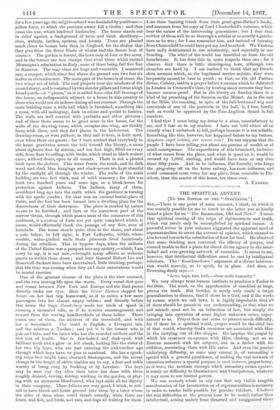THE SPIRITUAL ADVENT.
[To THE EDITOR OF THE 11 SPECTATOR.1
Sin,—There is one point of some moment, I think, on which it was scarcely possible for me to touch in the letter you so kindly found a place for on "the Incarnation, Old and New." I mean that spiritual coming of the reign of righteousness and truth, which can surely only be accomplished by spiritual means." A powerful writer in your columns suggested the apparent need of supernaturalism to arrest the current of opinion, which seemed to him to tend towards the substitution of Law for God. He observed that some thinking men contested the efficacy of prayer, and seemed unable to find a place for direct divine agency in the inter- nuked and ever-growing network of causation. It seems to me, however, that intellectual difficulties must be met by intellectual solutions. The " Knockmedown " argument of a divine interven- tion would scarcely, so to speak, be in place. And then, as Browning finely says :—
"Love, hope, fear, faith,—theae make humanity."
We may always trust human instincts to proclaim a Father in the skies. The need, to the apprehension of mankind at large, proves the truth. But beside; it surely only needs a larger generalization to discern, that if there be a God, and if He works by causes, which we call laws, it is highly improbable that all of these should be patent to our understanding, so that what we call miracle need not be an infraction of law, but simply the bringing into operation of some higher unknown cause, super- natural to us. Prayer does not seem to present muck difficulty, for if there be a spiritual world, prayer would be the chief law of that world, whereby God's creatures are associated with Him in the carrying out of His designs. He inspires the prayer by which his creatures co-operate with Him, dealing, not as an Eastern monarch with his subjects, but as a father with his children, associating them with His cares. And even the greater underlying difficulty, as some may esteem it, of reconciling a special with a general providence, of making the vast network of causation subserve a special purpose in each instance, prayer being, as it were, the medium through which secondary causes operate, is surely no difficulty to Omniscience and Omnipotence, whatever it may seem to our limited powers.
We can scarcely admit in any case that any visible tangible manifestation of the Incarnation or of supernaturalism is necessary in order to render faith possible for genuine thinkers. I believe the real difficulties at the present hour to be moral, rather than intellectual, arising mainly from distorted and exaggerated views of Atonement and of Judgment. The satisfaction of divine equity by the realization of perfect holiness in the creature is con- founded with an imaginary satisfaction of wrath, and if the Christian world is partially reproved and convinced by the Spirit respecting righteousness and sin, it seems ta me to have failed to discern hitherto the equity or the philosophy of judgment. But in any case, moral or intellectual difficulties can scarcely be dealt with by an exhibition of force. You cannot command Or con- strain love and righteousness, you can searcely make a man love you by levelling him with the dust.
On the Christian hypothesis, which you and I assume, why did not Christ overthrow His enemies permanently, in the garden, or on the tree ? He had the power, but would not use it, we say. Why ? Because He would only vanquish by love. "I, if I be lifted up, will draw all men unto Me." It was the exhibition of that absolute generosity, that unbounded magnanimity, which should melt, and purify, and elevate the hearts of men. And the ideal of that perfect holiness has sunk deeply into the core of Christendom. There is moral progress, there is elevation of thought and feeling from century to century. Compare Tennyson, the flower of the nineteenth century, with his predecessors. His artistic qualities are wonderful, but his supreme charm, the charm of In Memoriam and The Idyls of the King, resides in elevated Christian feeling. Whatever intellectual doubts may be expressed, the "ethos "of the Christian Revelation is there manifested. And this must surely grow and spread till "the bells ring in the Christ that is to be." Imagine the realization of some good men's specu- lations, the visible Advent of the Christ in judgment to overthrow His enemies. Can thunderbolts illumine souls? Could flaming lightning make the hearts of men more tender and more just? Have we not been taught to expect a spiritual triumph in the page of Revelation? If all kings are to fall down before Him, all nations to do Him service, this must surely be accomplished by spiritual means, the recognition of essen- tial truth and righteousness vanquishing, elevating, regenerating the souls of men. Not at least till the fullness of time is accom- plished, till, in fair fight and without extraneous aid, good has vanquished evil, and truth error, can we look for that final "restoration of all things," that direct divine manifestation, when God is to be All in all. Meanwhile, we walk by faith, not by sense and sight, and many influences must co-operate to the wished- for end. In spiritual things the first lesson to be learnt is tolerance, or to agree to differ, not to allow ourselves to speak or think too harshly even of those whom we consider narrow and intolerant. And then, a larger political, a kinder social life, must co-operate with the genial play of art, and the nobler works of science, and the Church Catholic in making ready a people prepared for the Lord— a people loving truth, righteousness, and goodness—and earthly kingdoms that are to be the kingdoms of the Lord and of His







































 Previous page
Previous page